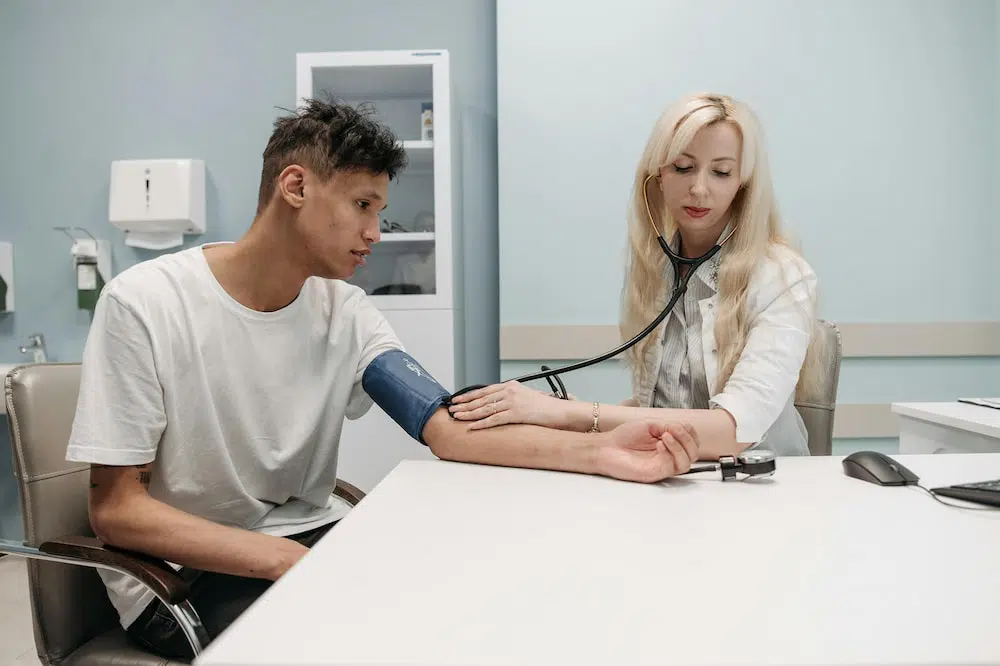
Understanding The Link: Sleep Apnea And High Blood Pressure Explained
Have you ever heard about the connection between sleep apnea and high blood pressure? Sleep apnea is when you stop breathing for short times while you sleep.
High blood pressure happens when the force of your blood against your blood vessel walls is too high.
Some people don’t know that these two can be linked. So, if you have sleep apnea, you might be at risk for high blood pressure.
Let’s dive in and understand this important link. It’s time to get the facts and take steps for a healthier life!
Understanding Sleep Apnea
Definition
Sleep apnea is a sleep problem. People with sleep apnea stop breathing for short times when they sleep. This can happen many times in one night. This is not normal and can be bad for health.
Common Symptoms
People with sleep apnea often don’t know they have it. But there are some signs to watch for:
- Loud snoring: Not everyone who snores has sleep apnea, but loud snoring can be a big sign.
- Long pauses in breathing: Someone else might notice this if they are sleeping nearby.
- Gasping or choking during sleep: This happens when the person starts breathing again after a pause.
- Feeling very tired during the day: This is because the person didn’t sleep well at night.
- Headaches in the morning: Not getting enough air can cause headaches.
- Trouble focusing: Being tired can make it hard to think clearly.
- Mood changes: Like feeling sad or getting mad easily.
Understanding High Blood Pressure (Hypertension)
What Is Hypertension?
Hypertension is another name for high blood pressure. Think of blood pressure like water in a hose.
We say the pressure is high when the water pushes too hard against the hose walls. In the same way, when blood goes too hard against the walls of our blood vessels, we call it hypertension.
Blood Pressure Ranges
Blood pressure has two numbers. The top number is called systolic, and the bottom one is diastolic. Here are the ranges:
- Normal: Less than 120/80 mmHg
- Elevated: 120-129/less than 80 mmHg
- Stage 1 hypertension: 130-139/80-89 mmHg
- Stage 2 hypertension: 140 and above/90 and above mmHg
Causes And Risk Factors
There are many reasons why someone has high blood pressure. Some of the common causes are:
- Overeating salt
- Not getting enough exercise
- Being overweight
- Drinking too much alcohol
- Having a family history of high blood pressure
Health Consequences
High blood pressure is not good for our health. It can cause problems in many parts of the body. Some of the issues it can cause are:
- Heart attack
- Stroke
- Kidney problems
- Vision loss
Prevalence And Demographics
Many people in the world have high blood pressure. It is common in older adults but can happen at any age.
Some groups, like African Americans, get high blood pressure more often. Men are also more likely to have it than women.
The Connection Between Sleep Apnea And High Blood Pressure
Scientific Research Findings
Scientists have studied many people to see if sleep apnea and high blood pressure are linked.
They found that people with sleep apnea often have high blood pressure. This means there’s a strong connection between the two.
Mechanisms Linking The Two
When someone has sleep apnea, they stop breathing briefly while they sleep. Every time they stop breathing, the body gets less oxygen.
The heart then works harder to send blood and oxygen to all body parts. This extra work makes the blood pressure go up.
Impact Of Sleep Apnea On Hypertension
People with sleep apnea often have hypertension. This is because their heart works extra hard at night when they stop breathing. Over time, this can damage the heart and blood vessels.
How Hypertension Can Worsen With Sleep Apnea
High blood pressure can get worse when someone has sleep apnea. Each time they stop breathing, their blood pressure spikes.
Over and over, night after night, this puts a lot of stress on the heart and blood vessels. It’s like putting too much air in a balloon many times.
Mutual Exacerbation Of Symptoms
Sleep apnea and high blood pressure make each other worse. When one gets bad, the other often does, too.
For example, when sleep apnea gets worse, blood pressure can rise. And when blood pressure goes up, sleep apnea can become more severe. It’s a cycle that can be harmful if not treated.
Factors Contributing To The Link
Role Of Oxygen Levels
People with sleep apnea often stop breathing for short periods while they sleep. This means their body gets less oxygen. Our body needs oxygen to work well.
When it doesn’t get enough, it can cause high blood pressure. Low oxygen levels tell the heart to work harder, raising blood pressure.
Influence Of Sleep Disruptions
Sleep apnea causes many wake-ups during the night. These wake-ups, even if short, disrupt deep sleep. Good sleep helps the body relax and lowers blood pressure.
But with sleep apnea, the body does not get enough rest. This lack of deep sleep can raise blood pressure.
Neurological And Hormonal Aspects
Our brains and hormones play a big role in controlling blood pressure. Sleep apnea can change how our brain and hormones work.
When sleep is not good, the brain sends signals to release stress hormones. These hormones make the heart beat faster, causing high blood pressure.
Obesity And Cardiovascular Health
Many people with sleep apnea have extra weight. Extra weight, especially around the neck, can block the airway during sleep.
This blockage causes sleep apnea. Extra weight also makes the heart work harder. A harder-working heart can lead to high blood pressure. So, sleep apnea and extra weight can raise the risk of high blood pressure.
Genetic Predisposition
Sometimes, our family history or genes make us more likely to have certain health problems.
Some people have genes that make them more likely to get sleep apnea or high blood pressure. And if someone in the family has these problems, other family members have a higher chance, too.
Diagnosis And Treatment Options
Diagnosing Sleep Apnea
Sleep apnea is when someone stops breathing for short times while they sleep. To find out if someone has sleep apnea, doctors use a test called a sleep study.
In this test, the person sleeps at a special clinic. Machines watch their breathing, heart rate, and other things.
When the machines show that the person stops breathing often while they sleep, they might have sleep apnea.
Diagnosing Hypertension
High blood pressure, or hypertension, means the heart works too hard to pump blood. Doctors use a blood pressure cuff to determine if someone has high blood pressure.
This tool wraps around the arm. It gets tight, then it lets go. A machine or the doctor reads numbers. High numbers mean high blood pressure.
Treatment Options For Sleep Apnea
There are a few ways to make your sleep better. Doctors can suggest ways to keep air moving smoothly for sleep apnea, such as oral medical devices and PAP machines, so you breathe better at night and sleep peacefully.
Treatment Options For Hypertension
High blood pressure needs treatment to keep the heart healthy. Some pills help. These pills relax the blood vessels or make the heart beat slower.
This lowers the blood pressure. Eating less salt, exercising, and losing weight can help too.
Coordinated Care By Healthcare Professionals
When someone has both sleep apnea and high blood pressure, they need extra care. Doctors, nurses, and other health helpers work together.
They share information and make plans. They help the person get the best care for both problems.
FAQs
1. Is High Blood Pressure From Sleep Apnea Reversible?
High blood pressure caused by sleep apnea is often reversible. Effective treatment, such as PAP machines and oral medical devices, can improve sleep quality, reduce apnea episodes, and lower blood pressure levels, helping to restore normal blood pressure in many individuals.
2. Can Untreated Sleep Apnea Affect Blood Pressure?
Untreated sleep apnea can significantly affect blood pressure during apnea events, cause oxygen levels to drop, and increase stress on the cardiovascular system. This can result in high blood pressure, increasing the risk of heart disease, stroke, and other related health issues.
Sleep Apnea And High Blood Pressure
Sleep apnea and high blood pressure are two health issues that often go hand in hand. When someone has trouble breathing while they sleep, it can strain their heart, leading to high blood pressure.
Knowing if you have these conditions is vital because the proper treatment can make a big difference.
By working with healthcare professionals and following their advice, people can improve their sleep, lower their blood pressure, and lead healthier lives. Always remember that addressing these issues ensures better sleep and protects the heart.



